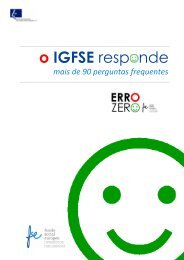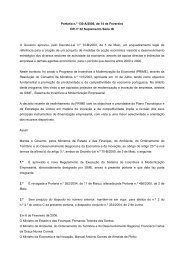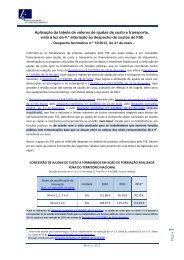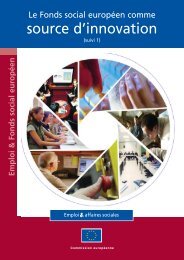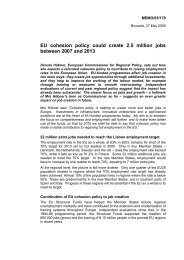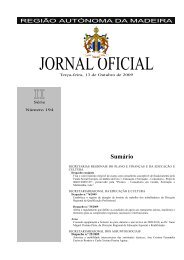Industrial Relations in Europe 2012 - European Commission - Europa
Industrial Relations in Europe 2012 - European Commission - Europa
Industrial Relations in Europe 2012 - European Commission - Europa
Create successful ePaper yourself
Turn your PDF publications into a flip-book with our unique Google optimized e-Paper software.
the newly emerg<strong>in</strong>g renewables sector, but it is presumed that representation is low on both sides of<br />
<strong>in</strong>dustries because of the small number of employees <strong>in</strong> the average firm.<br />
Active trade union strategies<br />
In a limited number of Member States, trade unions are actively pursu<strong>in</strong>g representation <strong>in</strong> the<br />
renewables sector. For example, <strong>in</strong> Germany the metalwork<strong>in</strong>g trade union IG Metall has called for<br />
greater action and is try<strong>in</strong>g to organise workers <strong>in</strong> the solar and w<strong>in</strong>d energy sector. The union cites<br />
examples of successfully concluded s<strong>in</strong>gle-employer agreements or of sett<strong>in</strong>g up works councils <strong>in</strong><br />
companies <strong>in</strong> these <strong>in</strong>dustries. However, IG Metall has not yet been able to conclude a sectoral<br />
collective agreement for the solar or w<strong>in</strong>d energy <strong>in</strong>dustries. The German services trade union ver.di<br />
additionally criticises ‘poor’ collective agreements and co-determ<strong>in</strong>ation structures <strong>in</strong> companies <strong>in</strong><br />
the renewable energy sector. Whilst ver.di wants to set up a campaign which aimed at extend<strong>in</strong>g the<br />
usual collectively agreed standards and co-determ<strong>in</strong>ation rights of the energy <strong>in</strong>dustry to the<br />
renewable energy sector, IG Metall is call<strong>in</strong>g for the conclusion of separate collective agreements <strong>in</strong><br />
the renewable energy sector, for example a sectoral collective agreement <strong>in</strong> the solar <strong>in</strong>dustry.<br />
In Latvia, the ma<strong>in</strong> trade union LAB Enerģija consistently works with new emerg<strong>in</strong>g parts of the<br />
sector. Recently two new trade union organisations have jo<strong>in</strong>ed LAB Enerģija. The results are<br />
limited regard<strong>in</strong>g the newly emerg<strong>in</strong>g parts of the sector, because the majority of new enterprises<br />
are very small, with between two and five employees. In Portugal, SINDEL and FIEQUIMETAL<br />
are try<strong>in</strong>g to recruit members and create organisational structures. In some cases the unions have<br />
begun negotiations on specific issues, as for <strong>in</strong>stance between MFS – Acciona Energy and the<br />
FIEQUIMETAL member union SIESI. However, it seems that unions have not been able yet to<br />
create an organisation <strong>in</strong> these new companies that would be capable of act<strong>in</strong>g. In Sweden, the trade<br />
union SEKO reports that workers <strong>in</strong> w<strong>in</strong>d turb<strong>in</strong>e-produc<strong>in</strong>g factories that are represented by the<br />
Union of Metalworkers (IF Metall) have been contacted through their workplace <strong>in</strong> an effort to<br />
persuade them to change trade union membership. There have been some disagreements over the<br />
sectoral attachment of workers <strong>in</strong> w<strong>in</strong>d turb<strong>in</strong>e manufactur<strong>in</strong>g. However, accord<strong>in</strong>g to the trade<br />
union SEF, most of the workers employed <strong>in</strong> construct<strong>in</strong>g w<strong>in</strong>d power facilities <strong>in</strong> Sweden come<br />
from abroad, notably Denmark and Germany. In the United K<strong>in</strong>gdom, all unions appear to seek to<br />
recruit <strong>in</strong> emerg<strong>in</strong>g areas. For <strong>in</strong>stance, the trade union Unite states: ‘Whether it be w<strong>in</strong>d, wave<br />
hydro or photovoltaic, our aim is to ensure that the “new wave” generators are as organised as the<br />
exist<strong>in</strong>g and achieve terms and conditions that are at the cutt<strong>in</strong>g edge of our negotiations.’ However,<br />
there are no reports of specific campaigns to recruit <strong>in</strong> these areas.<br />
Emergence of new <strong>in</strong>terest and bus<strong>in</strong>ess organisations<br />
Among all 28 countries monitored <strong>in</strong> the above-mentioned Eurofound study, only one new social<br />
partner organisation was registered on the employer side. In Romania, <strong>in</strong> March 2009, 40 RES<br />
companies, most of them SMEs, united <strong>in</strong> an Employers Association for New Sources of Energy<br />
(Asociaţia Patronală Surse Noi de Energie, SUNE). In two countries (Germany and Denmark) it has<br />
been reported that established employers’ organisations have opened new branches to represent<br />
parts of the newly emerg<strong>in</strong>g sectors. In Germany the association for the glass <strong>in</strong>dustry decided to set<br />
up a unit for the solar <strong>in</strong>dustry <strong>in</strong> 2008, a step reflected <strong>in</strong> a change of name to the Association for<br />
the German Glass and Solar Industry (Bundesarbeitgeberverband Glas und Solar, BAGV<br />
Glas+Solar). In Denmark, DI has formed a new branch federation with<strong>in</strong> the organisation, DI<br />
Energy of which another federation, DI Bio Energy, is a part. However, these federations do not<br />
take part <strong>in</strong> collective barga<strong>in</strong><strong>in</strong>g.<br />
212



